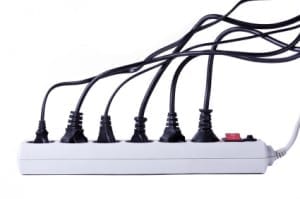Why You Should Buy a Power Conditioner For Your Home Studio
When it comes to protecting the gear in your home recording studio, it’s a no brainer that you’ll want some kind of surge protector to prevent electrical surges from frying your equipment -- which also is your investment. Though there are tons of power strip models that range from a few bucks up into the thousands of dollars, the question you should probably be asking yourself is not ‘What kind of power strip should I buy?’ but ‘Should I buy a power conditioner for my home recording studio?’.

Here we want to look at the advantages of choosing a power conditioner rather than a traditional power strip. There are two primary advantages to choosing a power strip.
1. Electrical Noise Reduction
You’ll be able to tell that many power conditioners are made specifically for recording studios when you see that they come as rackmount units. And one of the things that they do for specifically for studios is cancel out noise created by all of your equipment.
These filters are designed to eliminate the noise generated by each piece of equipment you have, as well as by noise interference caused by multiple types of gear. If you've had many pieces of gear plugged into the same electrical circuit without any kind of power strip at all, you've likely clearly heard this interference in your recordings. With a power conditioner, this noise will likely be reduced significantly if not eliminated completely.
2. More Effective Surge Protection
Another advantage of going with a power conditioner is that it offers much better surge protection than inexpensive power strips. Any strip is of course designed to stop surges, though less expensive models can only stop smaller surges, and larger surges will pass through to your equipment.
The price of your power conditioner will likely determine how effective your surge protection will be. While less expensive models will stop nearly all surges from going through to your equipment, some of the conditioners themselves be destroyed in the process. At that point, you’ll have to replace or repair the conditioner, though your equipment will likely be safe.
More expensive models, however, can handle nearly any type of surge, and not only will protect your equipment but also will continue to be effective.
How Much Should I Expect to Pay for a Power Conditioner?
Like any other piece of studio gear, this will vary greatly, though there many models that offer great protection are around the $200 mark. Those that will protect your gear at the expense of themselves may be around half that price.
Should I Invest in a Voltage Regulator?
Voltage regulators essentially do the same thing as power conditioners, while at the same time insuring that exactly 120 volts are being passed to your equipment at all times. This number, of course, is for the U.S.
While this is obviously the ideal situation, regulators get pretty expensive, and tend to start around the $2,000 mark. While this may be the easy choice for larger studios, this typically is not within the budget of most home studio owners, and a power conditioner will usually do the job just fine.




